Is Dropshipping a Scam? Top 7 Scams & How To Avoid Them
Are you a beginner in the world of dropshipping and worried about falling victim to dropshipping scams? It’s no secret that the dropshipping industry has its fair share of fraudulent practices.
But fear not! With the right knowledge and awareness, you can protect yourself and your business from these scams. And I got your back! 👐
Beware, falling for a dropshipping scam can not only result in financial loss but also damage your reputation as a business owner.
Therefore, to ensure a successful and secure dropshipping journey, it is crucial to familiarize yourself with the common scams and learn how to avoid them.
This article will provide you with valuable insights and practical tips on how to identify and avoid dropshipping scams, allowing you to build a profitable and trustworthy business.


Table of Contents
- What Is Dropshipping & How Does It Work?
- How To Identify Dropshipping Scams? [Top 7 Dropshipping Scams]
- How To Avoid Dropshipping Scams? [ Top 7 Solutions To Avoid Dropshipping Scams]
- The No. 1 Tool for all dropshippers – now with AI
- Why People Think Dropshipping Is A Scam?
- FAQs – Dropshipping Scams
- Conclusion
What Is Dropshipping & How Does It Work?
Before I dive into dropshipping scams, let’s explain what exactly the dropshipping business model is!
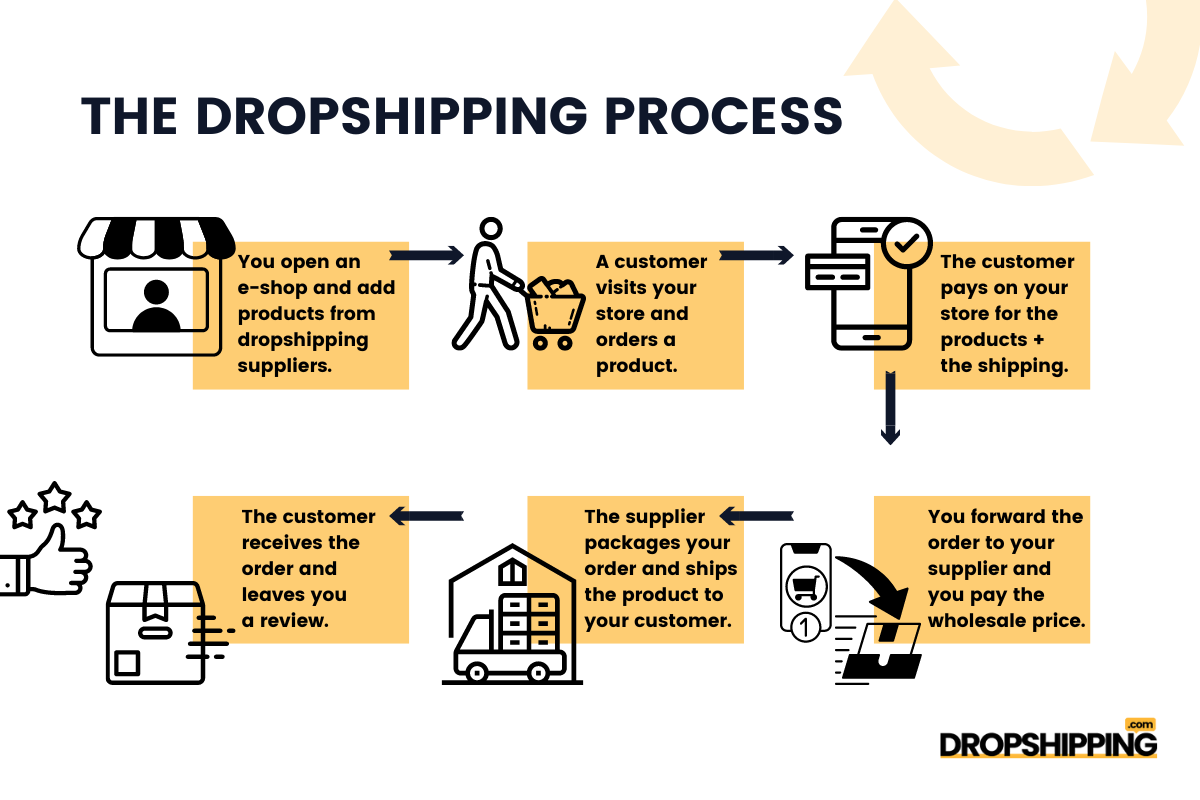
Dropshipping is a business model where an online retailer doesn’t keep products in stock. Instead, they partner with a wholesale supplier who stocks the inventory. When a customer purchases a product from the retailer’s online store, the retailer then purchases the item from the supplier.
The supplier then ships the order directly to the customer, meaning that the retailer never physically handles the product. Thorough research, niche selection, and customer engagement are crucial for running a successful dropshipping store.
Hence, the dropshipping business model has gained popularity due to its low costs and ease of entry.
They can sell a wide variety of products from multiple suppliers without handling inventory or managing shipping logistics.
👉 Check out the Pros And Cons Of Dropshipping: Does It Actually Work?
For instance, have you heard about ZAFUL? It is one successful example of a dropshipping business. 👇

They specialize in selling trendy fashion items and accessories. Zaful partners with various wholesalers to source their products and showcase them on their website.
Plus, through effective marketing and a focus on customer service, Zaful has become a popular and profitable brand in the dropshipping market.
💡 Tip: Read about Is Dropshipping Worth It In 2024? The Harsh Truth.
Now, let’s dive into the most common dropshipping scams!
How To Identify Dropshipping Scams? [Top 7 Dropshipping Scams]
Although it is not always easy to identify dropshipping scams, some of them can give common signs. Thus, I will list the most common dropshipping scams. Let’s start!
Scam 1: Fake Products, Low Quality, High Price
As a dropshipper, you don’t get access to products you sell. As a matter of fact, dropshipping is the kind of business model where suppliers ship products directly to the customers, and you do not hold inventory.
But, you must be aware that various suppliers aren’t trustworthy. You can order products at low prices from suppliers because this gives you space for higher profits, but these products might be of low quality.
Furthermore, never believe that dropshipping products are original! In fact, most dropshippers supply their products from AliExpress.
There are products from various brands, like Nike, Adidas, Puma, Converse, and many more, at incredibly low prices. And, of course, they are fake!
For instance, just look at the store’s names on AliExpress. Additionally, be cautious of out-of-stock scams where suppliers advertise products they don’t have in stock, leading to financial consequences and customer dissatisfaction.
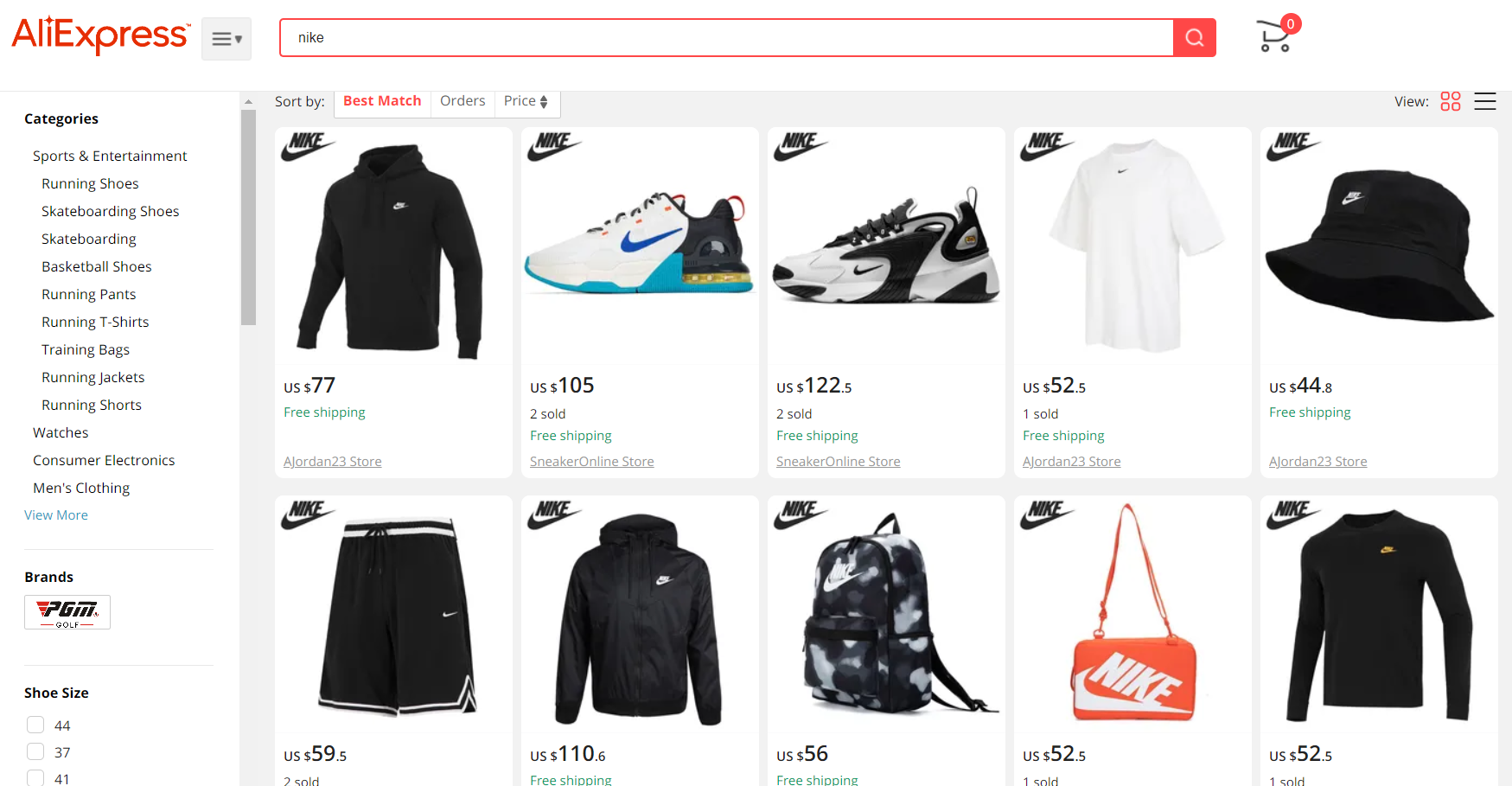
However, many dropshipping suppliers claim that they are the Original Equipment Manufacturer of the product, which is obvious that they are not.
Do you want to examine this a little further? Let’s check out the customer reviews. 👇
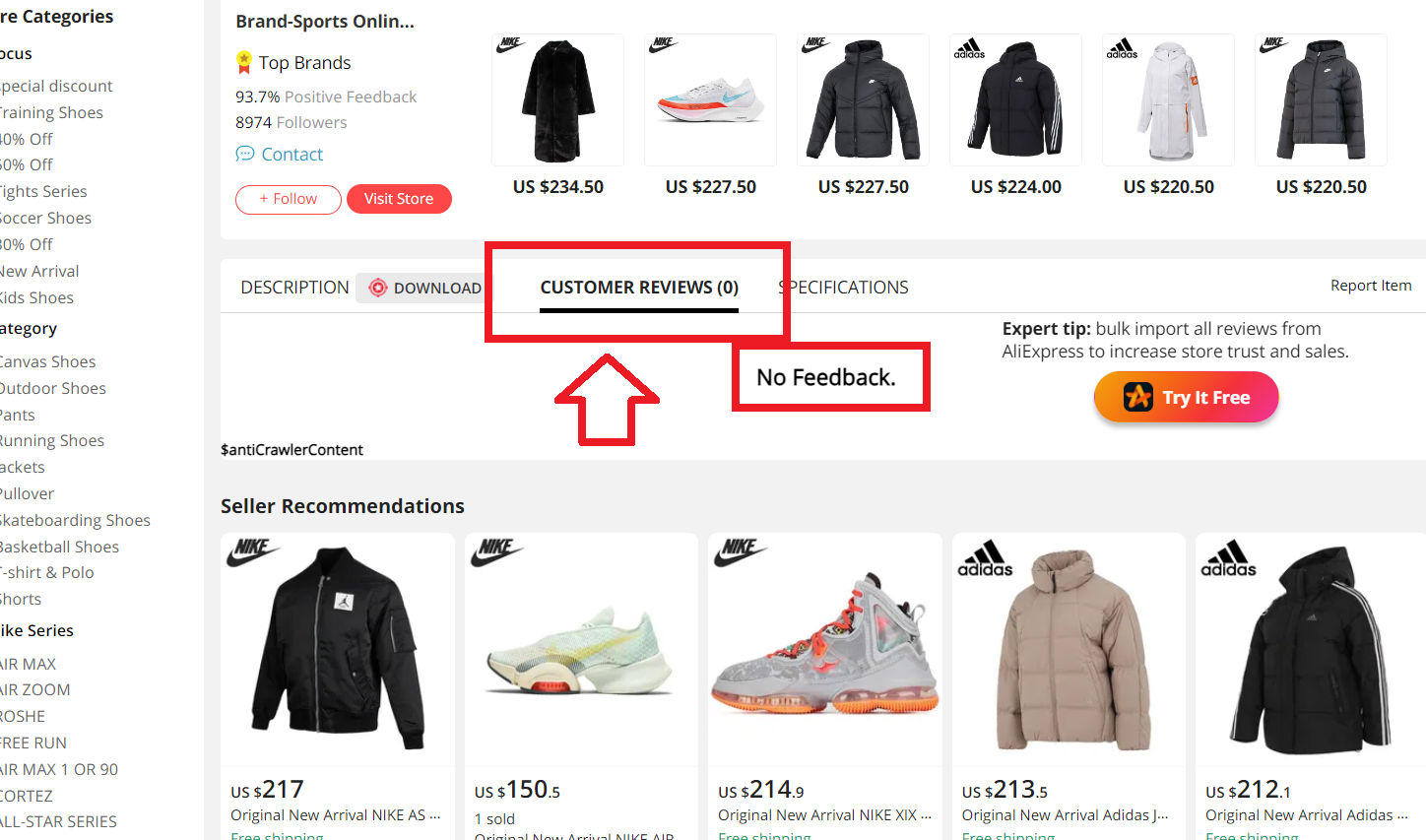
And of course, as I expected – 0 reviews! This rings the bells in the sound of -FAKE! Hence, believe me, AliExpress shoppers love leaving reviews, and this one has none. So, be careful.
So, you will eventually get negative reviews or refund requests from customers who claim that the product they received is not what was described. This can be critical to your business’s success.
Scam 2: Phony Product Samples
Be careful about this matter because not everything seems as it looks! At first sight, you might say- “Yeah, how nice. This supplier seems legitimate and sends product samples.” But a moment later, you might be surprised.
Many sellers give misleading samples, yet the final product may be damaged or of poor quality.

Since you cannot personally examine each product as a dropshipper, they take advantage of this. Instead of simply stealing your money, they would supply poor products to your customers to earn a good profit.
This might be the reason consumers frequently complain about the quality of your products. Moreover, this has the potential to ruin your brand’s reputation entirely.
Scam 3: Fake Suppliers and Reviews
It’s possible to find dropshipping businesses that are completely fake while looking for the ideal dropshipping supplier.
By displaying an excessive inventory and maintaining their claim that they are selling their goods at wholesale pricing, these scammers may appear credible.
Furthermore, it might be challenging to confirm that you’ve dealt with this particular scam because many reliable suppliers sell certain things at retail pricing.
Moreover, scammers can easily create fake websites and fulfill them with false positive testimonials and feedback, so sometimes it’s hard to report it as a scam.
Read about Testimonial Advertising: 11 Proven Examples To Sell More.
Scam 4: Fraudulent Payments
Another scam you should pay attention to is suppliers that may disappear after a payment!
The majority of the time, scammers would make an attractive offer and portray it as a once-in-a-lifetime chance to win your trust. But, they would just vanish after receiving the payment.
Furthermore, this type of supplier will probably ask for payment offline.
Scam 5: Schemes for Get-Rich-Quick
Dropshipping’s appeal as a simple way to earn passive money while working from home contributes to some of its development. While some people do experience financial loss, a large majority do not.
Unfortunately, social media advertising is one of the main ways that people get into the dropshipping industry. If you spend enough time on Facebook, Instagram, or YouTube, you’ll probably come across an advertisement with a person boasting about how much money they earned while working from home.
And here’s how it happens!
First, you will be contacted by a “dropshipping expert” who claims to have the “success recipe for dropshipping”.
Next, you’ll learn the secret to reaching your financial objectives and earning thousands of dollars. The drawback is that learning the “success recipe“comes with a price.
What happens next? You are guessing it already: the dropshipping expert will block you and vanish from sight as soon as you send the fee.
At the end of the sad story, you got scammed. Starting and growing one’s own business requires hard work, dedication, and smart strategies.
Scam 6: Middleman vs True Wholesalers Dropshipping Program
Most middlemen in dropshipping pretend to be wholesalers by offering a similar dropshipping program. However, it’s not the same.
A middleman is what stands between a product’s manufacturer and its retailer, or the consumer is a middleman. A middleman is a person who represents a company’s products but does not actually deliver the goods themselves, and also, they do not have a warehouse.
They only act as a channel for the actual business that will fulfill the orders and ship the goods to the store or the customer.
Working with a middleman or sub-wholesaler prevents you from receiving the best wholesale prices since these “wholesalers” increase the wholesale price instead of you purchasing the goods straight from the manufacturer at a lower price.
💡 Tip: Check out the 15 Best Dropshipping Wholesale Suppliers in the USA.
Scam 7: Inflated Shipping Costs
Detecting inflated shipping costs in the dropshipping business can be tricky, but there are a few telltale signs. One major indicator is a supplier’s lack of transparency.
If a supplier is hesitant to give clear shipping quotes or has vague terms and conditions, this might be a red flag.
For instance, you might encounter a situation where you’re trying to get a straightforward shipping estimate, but the supplier keeps giving you roundabout answers or directing you to complex terms that don’t clearly outline the costs.
Another sign is inconsistent shipping rates. If you notice that the shipping costs vary greatly without any apparent reason or seem significantly higher than the average market rates, it could indicate inflated prices.
For example, if you receive a shipping quote that is double what similar suppliers are charging and there’s no clear explanation for the discrepancy, it’s worth investigating further.
How To Avoid Dropshipping Scams? [ Top 7 Solutions To Avoid Dropshipping Scams]
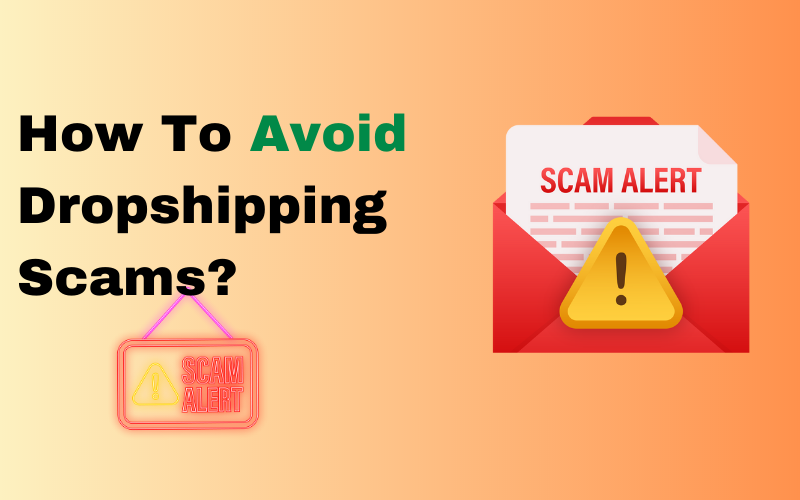
Unfortunately, dropshipping scams occur, and you cannot stop them. But there’s always a way to avoid them. So, next, I will give you a few solutions for dropshipping scams and how to avoid them.
Solution 1: Fake Products, Low quality, High price
Firstly, if you can meet the suppliers in person, this is your best option. For example, you can also attend a trade show intended for the niche you sell in. Renting a booth at a trade show costs a lot, so this might be the sign that suppliers that are attending there are legit.
Moreover, if you can’t meet the suppliers in person, you can browse their websites to see if there is more information. Thorough market research is crucial to identifying reliable suppliers and high-quality products. Always search for contact info and physical addresses. You can also request product samples from suppliers to verify the product quality.
Furthermore, you may explore a supplier’s store and go through the reviews before deciding to work with them. You decide whether to place an order or not after the evaluation. Typically, a supplier will be trustworthy if the majority of the store’s feedback is positive.
For instance, I am using the Adserea app, which helps me check on winning products that are selling well in different marketplaces. Plus, I can also see the dropshipping suppliers that deliver these products. 👇
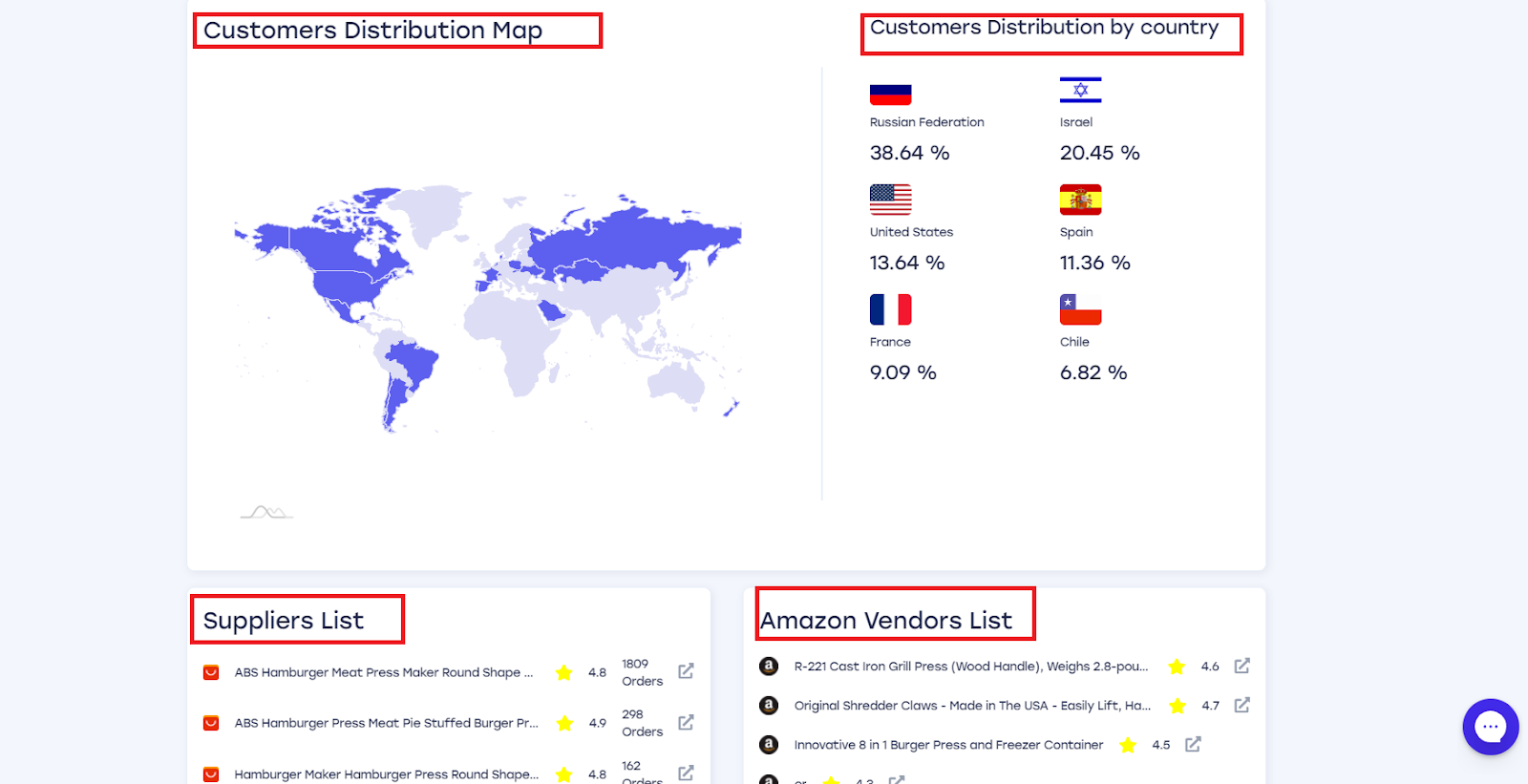
Also NOTE: I suggest you stay away from selling counterfeit products unless you are sure that you work with reputable distributors or direct manufacturers. Otherwise, you can be dragged into legal accusations and copyright issues.
Check out Dropshipping Product Research Tools: How To Find Winning Products In 2024?
Solution 2: Phony Product Samples
Scammers can make tricks, but so do you! The first thing you can do is place an order in other names or from another address and see what the supplier is sending. This is the cheapest method you could use and inspect suppliers’ legitimacy.
Moreover, the best solution for your business might be to hire a third-party QA agent. The QA inspects each product before it is shipped. If the product has a defect, the QA agent will address the issue with the supplier.
Solution 3: Fake Suppliers and Reviews
There are various ways to verify suppliers’ legitimacy. First, you can ask for their company registration number and business license number. Scammers don’t give such basic registration information online in order to prevent it from being tracked.
Furthermore, search for their area code, not just the firm address or phone number.
Another good solution to this matter is hiring a dropshipping agent. There are various reliable dropshipping agents or directories like Dropshipping.com that can find or list trustworthy suppliers.
What’s more, to confirm a supplier’s legitimacy, you must read their reviews, but only if the reviews are legitimate. Today, many suppliers are receiving false reviews, and it might be challenging to reveal whether they are real or not.
For example, I personally browse for negative reviews. Also, right after a consumer posts a negative review, suppliers frequently receive many false positive comments. So, be careful.
For instance, if the supplier has only a few positive reviews, let’s say five out of 50, it is likely that those five reviews are fake!
Also, you can review customer complaints and see if the majority of them deal with the same problem with the products. If so, it might be likely that the supplier is faking the reviews.
However, for this purpose, I personally use the Up Assistant extension👇
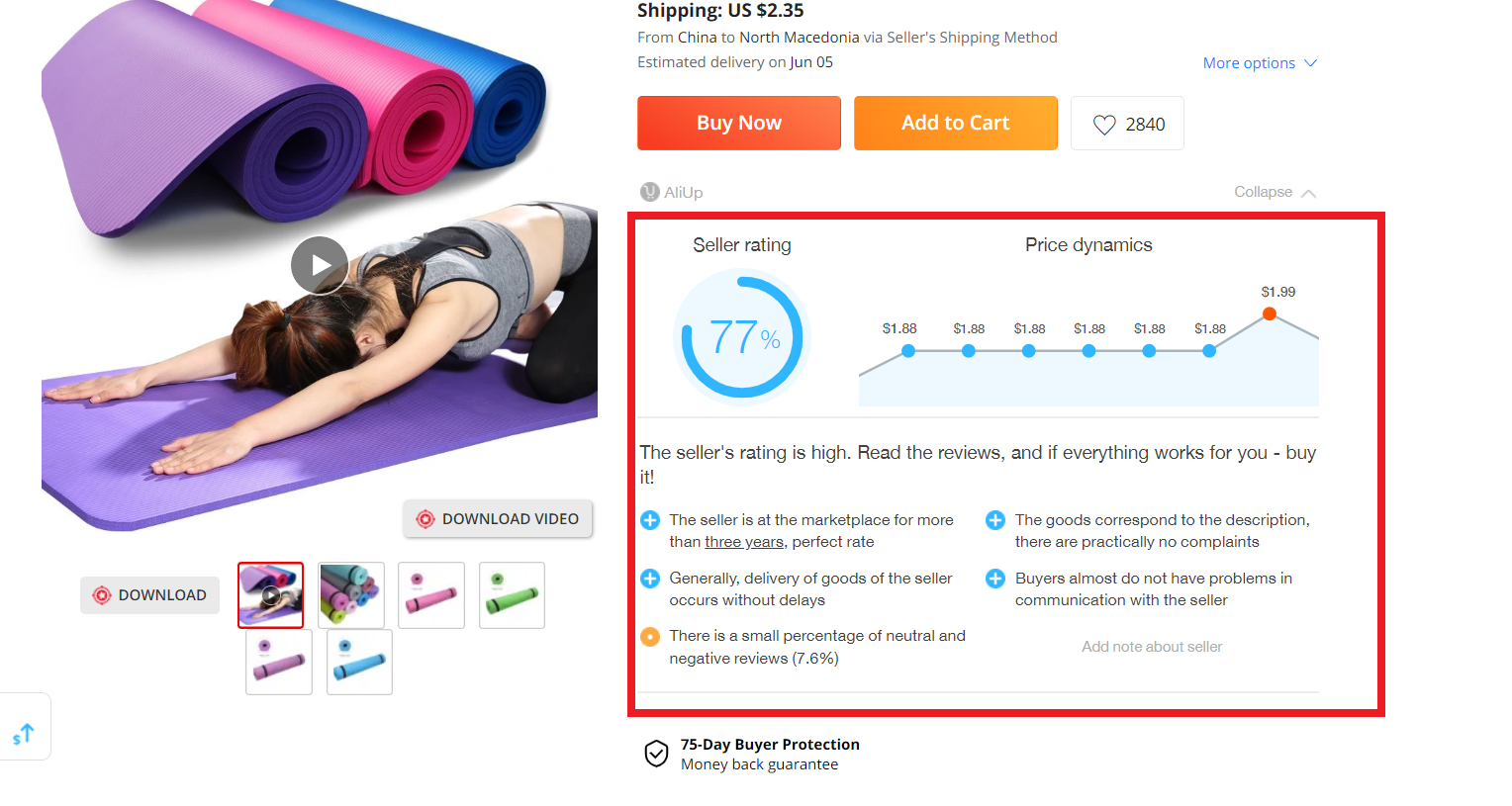
This revolutionary Chrome extension from AliExpress adopts a comprehensive approach to evaluating sellers, taking into account more than just their feedback.
It also incorporates additional important factors like their duration of presence on AliExpress and their ability to communicate effectively with buyers.
Solution 4: Fraudulent Payments
First thing first—DO NOT send money offline! Most dropshipping platforms, like Aliexpress or Alibaba, for example, have an escrow service designed to build trust between buyers and sellers. Additionally, it is crucial to consider shipping costs when evaluating suppliers, as inflated shipping costs can negatively impact profit margins and product prices.
However, even if you are working outside Alibaba or AliExpress, you can use an escrow service or read customer testimonials on dependable websites like Trustpilot.
Nowadays, you can check some of the best payment gateways for dropshipping based on payment types, fees, integrations, insurance, etc.
For example, PayPal allows you to file a dispute on their platform and report fraudulent activity in detail.
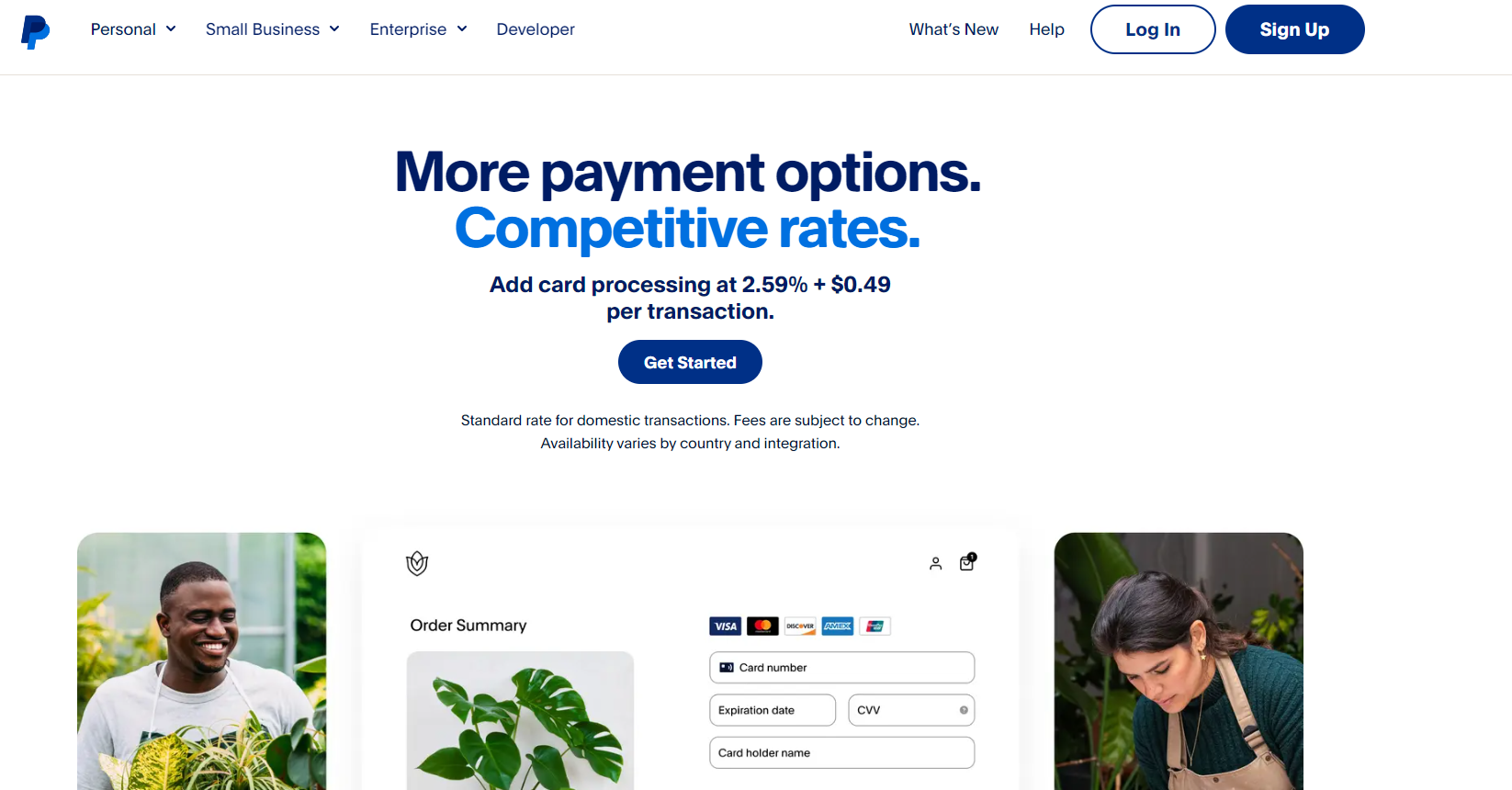
Solution 5: Schemes For Get-Rich-Quick
Anyone who claims that you can start earning money right away by paying them a monthly fee is scamming you.
Moreover, those scammers can go that far by convincing you that you can succeed by creating a fake customer base (followers) on social media and selling in large portions.
The best way to avoid this scam is to know that there’s NO short way to success. Every business model requires hard work, time, and energy.
If you want to help yourself, you better educate yourself with dropshipping experts or free online resources to learn dropshipping, rather than paying fees to fake professional dropshippers.
Solution 6: Middleman vs Wholesalers dropshipping program
Instead of sourcing items and offering amazing catalogs, pricing, and shipping dates, middlemen and their dropshipping programs excel at SEO and self-promotion.
If a term or phrase appears on the top page of the search engine, it does not always imply that the website and the business are legitimate. A middleman covers the source while posing as the supplier. Having control over the supply chain is crucial to ensure product quality and customer satisfaction.
It’s noteworthy to note that the majority of genuine supplier programs don’t typically have “dropshipping” in their title, URL, or even most of their keywords.
They frequently start as a bulk wholesaler for their merchants and only provide the dropshipping program as an additional choice that you may utilize on its own or in conjunction with your wholesale orders for your website.
👉 Read about Seller’s Permit vs. Business License: What Do You Need to Start Selling Online?
Solution 7: Inflated Shipping Costs
Once you’ve identified potential inflated shipping costs, there are several strategies you can employ to manage the situation effectively.
Firstly, it’s crucial to communicate directly with the supplier. Ask for detailed breakdowns of the shipping costs and seek clarification on any vague terms or conditions. This transparency can sometimes resolve misunderstandings and bring the costs down to reasonable levels.
For example, you might explain to the supplier that other vendors are offering significantly lower rates and ask them to match or at least justify their prices. If the supplier is unwilling to provide clarity or adjust their prices, it may be time to consider alternative suppliers.
Additionally, comparing shipping costs from multiple suppliers can provide a benchmark for what you should be paying. Websites and platforms that aggregate shipping quotes can also be useful tools in this regard.
By presenting competitive quotes to your supplier, you can often negotiate better rates.
So, I recommend you consider leveraging technology to manage and optimize shipping costs. Various software solutions can help track shipping expenses, identify anomalies, and suggest cost-saving measures.
For example, ShipStation helps you manage your shipping processes by providing rate comparison, automation, and integration with various carriers and e-commerce platforms.
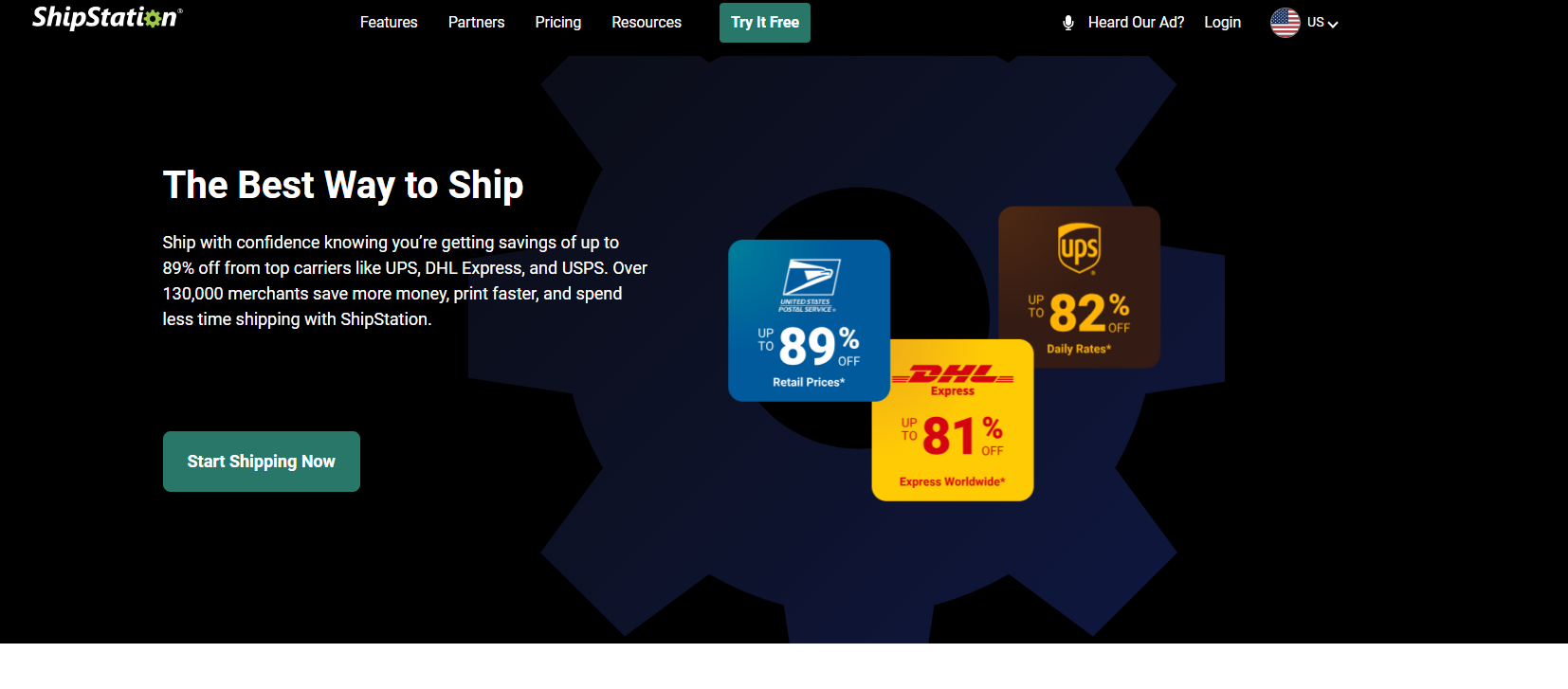
Why People Think Dropshipping Is A Scam?
As a dropshipper myself, I can confirm that dropshipping as a business is not a scam.
Hence, unlike pyramid schemes and other business models that, for the most part, take advantage of people and essentially scam them, dropshipping is a very legitimate way to make money and provide value to your customers.
Dropshipping is not a get-rich-quick scheme; it requires effort, dedication, and day-to-day management to overcome its drawbacks and obstacles.
However, because there are many scammers looking for ways to take advantage of this business model, the consumers and the dropshippers themselves, some people have the impression that dropshipping itself is a scam.
Hence, let’s see why people think that dropshipping is a scam ( which definitely it is NOT).
➡ What do Scammers do?
In the role of a consumer, you might have experienced this yourself. If you have ever received poor quality goods (when you were expecting the opposite) or fake goods, you know exactly what I am talking about.
Some illegitimate dropshippers (scammers) take advantage of uninformed and not very careful consumers by promoting one thing but delivering something completely different.
➡ NOT the customer’s fault
But sometimes, it’s not the consumer’s fault. Some scammers go to great lengths to create a facade that demonstrates trust – fake reviews, photos of a better-quality version of the product, false claims, etc.- and even a careful person might fall for it.
This is why consumers often consider dropshipping a scam.
➡ NOT dropshippers fault
On the other side, if this has happened to you, it might not be the dropshipper’s fault either. There are suppliers that are also scammers that will take advantage of inexperienced dropshippers and deliver low-quality goods to their customers while presenting something completely different.
It is crucial to find a legitimate supplier to avoid such issues. There are ways to protect yourself from this, which I will explain in a minute.
For example, I personally search for dropshipping suppliers on reputable supplier directories, like Dropshipping.com.
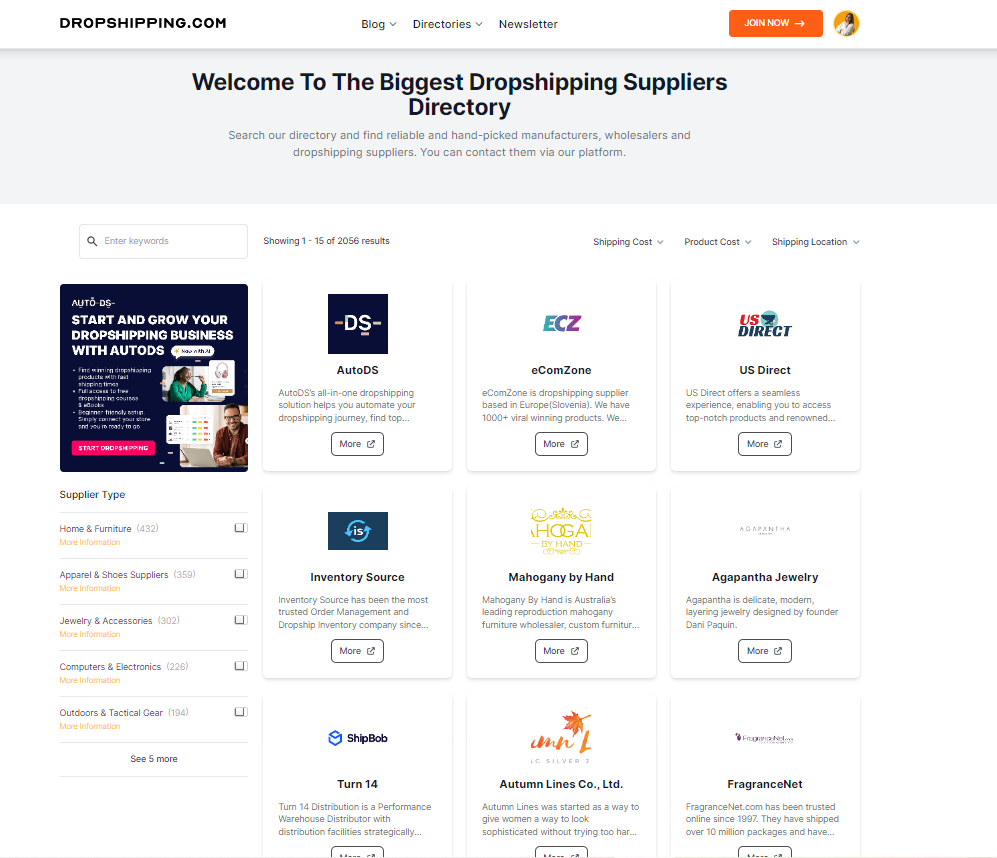
Here I can narrow down my search based on dropshipping niche, product costs, shipping costs, location of the supplier, etc.
Plus, the platform provides me with valuable information about the suppliers, like MOQ requirements, product price range, order processing time, shipping information, etc.
Now, let me tell you about the biggest scam of all in the drop shipping business.
Because this is a hot topic and attracts many young people and inexperienced entrepreneurs, they easily fall for the aggressive advertising that dropshipping is a way to get rich overnight. As you can imagine, this is obviously not true—at least for 99.9% of people.
So, beginners who are not informed correctly or do not research before jumping into a certain niche might expect more and get less. This might lead them to a bad experience of dropshipping, and they might think that it is a scam.
However, people frequently forget that all businesses, regardless of their format, run the danger of being scammed. Let’s find out what you should watch out for!
👉 Also, check out Is Shopify Legit in 2024? +6 Common Shopify Scams.
What To Do if You’re a Victim of a Dropshipping Scam?
Step 1: Gather Evidence
Begin by collecting all the evidence you can find. This includes your customer data, like order confirmations, receipts, and screenshots of any misleading product descriptions or promises.
Also, save every email, chat transcript, and social media message exchanged with the dishonest suppliers or the so-called “guru.”
Additionally, record the website URL, the business name (if available), and any contact information you have.
For example, if you buy a product that is advertised as high-quality but receives a cheap knock-off instead, take pictures and keep all related communications.
Step 2: Report the Scam
After gathering your evidence, it’s time to report the scam to the relevant authorities.
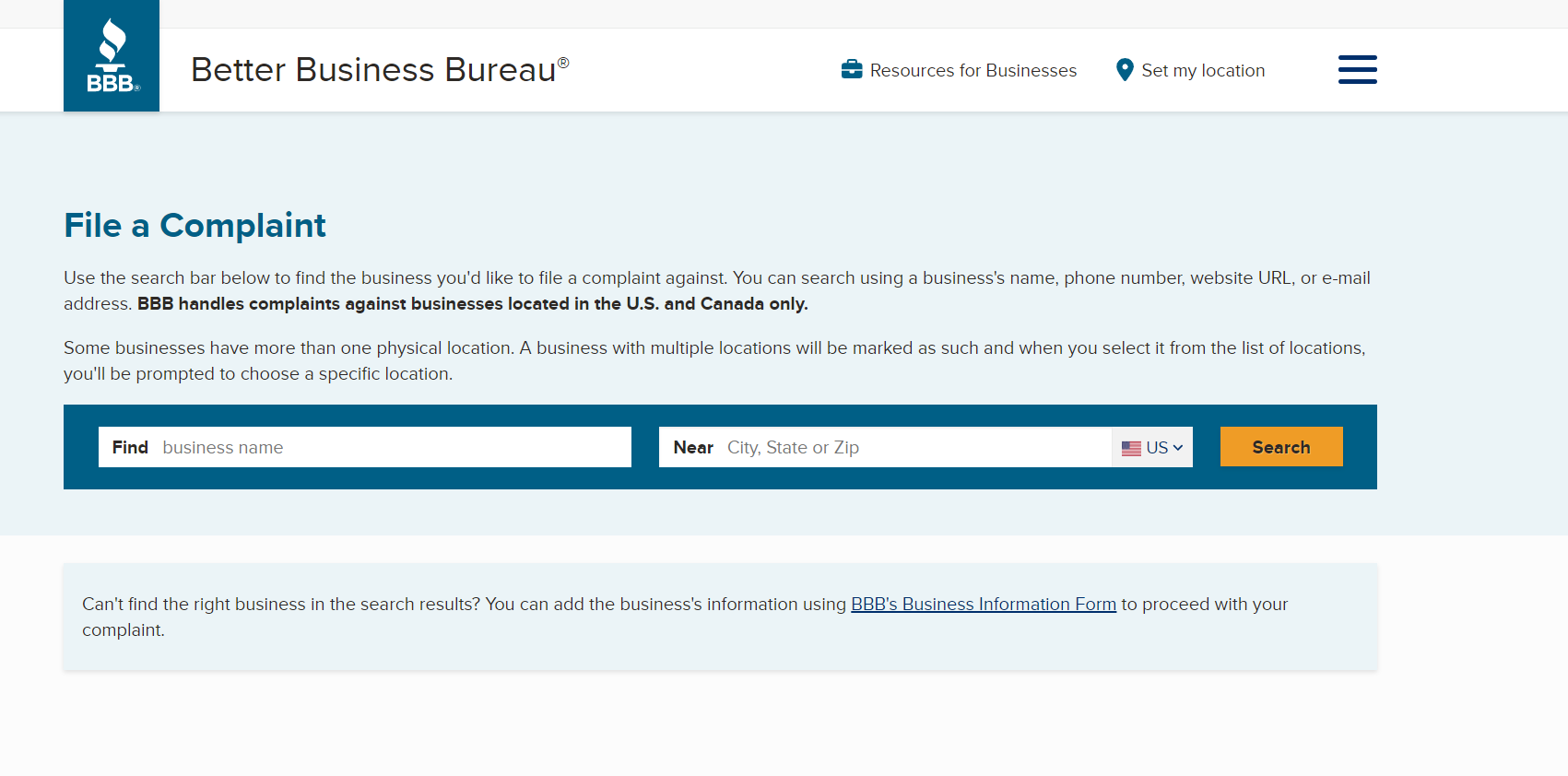
So, if you are a US citizen, you can report to some of these institutions:
- Better Business Bureau (BBB): Contact the BBB in the area where the business is located to file a complaint.
- US Federal Trade Commission (FTC): Use the FTC’s complaint portal to report the scam.
- Internet Crime Complaint Center (IC3): You can file a complaint through IC3, which is a collaboration between the National White Collar Crime Center and the FBI.
- econsumer.gov: This network of government organizations can help prevent future fraud. Use their tool to report your experience.
For instance, if you were scammed by a supposed dropshipping mentor who promised access to exclusive suppliers but delivered outdated, generic information, report every detail through these channels.
However, if you’re located outside the US, such as in Canada, report the scam through your national anti-fraud center. For other countries, search for options your government provides to report such scams.
Many countries don’t have an equivalent to the BBB. In such cases, reporting the scam to the BBB can still be beneficial, as it raises awareness and helps others avoid similar scams.
Therefore, always look for unbiased reviews and opinions before making any financial commitments.
Step 3: Pursue Legal Action
Consult a lawyer who specializes in consumer fraud to explore your legal options. They can advise you on whether it’s possible to take legal action and how to proceed.
For example, if you lost a significant amount of money, a lawyer can guide you through the process of seeking compensation.
Step 4: Notify International Authorities
If the scammer is located in another country, such as China, contact the trade division of that country’s embassy in your country.
For instance, if the fraudulent company is based in China, reach out to the Chinese Embassy for assistance. Although it’s uncertain if they will act, it’s worth a try.
FAQs – Dropshipping Scams
1. What are the common dropshipping scams to watch out for?
Entrepreneurs should be aware of several common dropshipping scams. These include fake websites, fraudulent purchases, poor product quality, credit card fraud, and fake reviews.
Identifying these scams early on can help dropshippers avoid potential losses and protect their reputation. It is important to thoroughly research and vet potential suppliers and partners to ensure legitimacy and reliability.
2. How can I avoid dropshipping scams?
To avoid dropshipping scams, it is essential to conduct thorough due diligence before engaging with any suppliers or partners.
This includes verifying their contact information, checking for negative reviews or complaints, examining their product quality, and assessing their overall credibility.
Additionally, dropshippers should use secure payment methods and track their transactions to mitigate the risk of credit card fraud.
3. How do drop shipping scams work?
Dropshipping scams work by deceiving unsuspecting entrepreneurs who are looking to start their own online businesses.
These scams typically involve fraudulent dropship suppliers who promise low-cost wholesale prices and a wide range of products. They often request upfront fees or monthly costs for access to their supplier network.
Once the entrepreneur makes the payment, they soon realize that the products they purchase from these suppliers are of poor quality or never arrive at all. The scammers may also use fake websites and provision fake contact information to create the illusion of a legitimate business.
4. Is dropshipping considered high risk?
Dropshipping itself is not considered high risk. It is a legitimate business model that allows entrepreneurs to start an online store without inventory. However, like any business, there are risks involved.
One of the main risks associated with dropshipping is the potential for scam suppliers or fraudulent purchases.
5. Are Dropshipping sites legit?
Yes, dropshipping sites can be legitimate. However, it is important to exercise caution and do thorough research before partnering with any dropshipping company.
6. How many dropshippers fail?
Many dropshippers can fail due to various reasons such as poor product quality, unreliable suppliers, intense competition, and lack of marketing skills.
While dropshipping can be a profitable business model, it requires dedication, research, and careful planning to succeed. Building a successful dropshipping store involves vetting suppliers, prioritizing product quality, and protecting customer data.
💡 Tip: Read about Dropshipping Business Plan: Tips for Creating A Short Business Plan.


Conclusion
Dropshipping, like any other business model, can be a profitable business model, but only if you dedicate yourself to it with your time, energy, and effort.
However, most dropshipping beginners start their businesses uninformed or falsely informed that dropshipping is easy to lead and get-rich-quick business model, and this is when they make their first mistake. Moreover, they get disappointed when things go wrong or they are left without money.
All these things are not negativities on the dropshipping account but on the dropshippers!
Dropshipping scammers are everywhere, just like scammers in every other business. So the smartest decision you can make is to inform yourself about the dropshipping scams and ways to avoid them! This is what this article is here for, to help you out!













![The Top 21 3PL Companies Compared [2024 List & Guide]](https://images.weserv.nl/?url=https://prod-dropshipping-s3.s3.fr-par.scw.cloud/2024/03/Frame-3922469.jpg&w=420&q=90&output=webp)